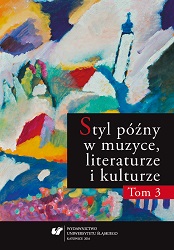Oscar Wilde, James Joyce, Flann O’Brien. Różne oblicza schyłkowości w procesie relatywizacji absolutu
Oscar Wilde, James Joyce, Flann O’Brien. Different Aspects of Decadence in the Process of Relativisation of the Absolute
Author(s): Dariusz Pestka
Subject(s): Language and Literature Studies, Fine Arts / Performing Arts, Music
Published by: Wydawnictwo Uniwersytetu Śląskiego
Summary/Abstract: Oscar Wilde, only nominally representing the Victorian Era, remained very much a contrarian in his artistic endeavours, not in the social and political sphere, but rather in the artistic and moral sense. As a representative of aestheticism, he remained under the idealistic theories of John Ruskin, at the same time succumbing to the impressionist visions of Walter Pater and referring to French symbolists. James Joyce, in his aesthetic credo, eschewed the idea of moral renewal in the religious sense, but at the same time heavily alluded to the aesthetic conception rooted in Thomism. Through his extensive use of experimental techniques, which constitute the very essence of modernism, and his use of parody, he presented the history of humanity focusing on the disintegration of language and its primary communication functions. Flann O’Brien, on the other hand, a writer of the late modern period, anticipated the tendencies characteristic of postmodernism and adopted a sceptical attitude towards the epistemological tradition of the Western civilisation. The ambiguity of O’Brien’s prose manifests, among others, in his use of Menippean satire, which the author utilises in order to allude to the narrative characteristic of the 20th-century anti-utopia with post-apocalyptic undertones, at the same time parodying that literary convention.
Book: Styl późny w muzyce, literaturze i kulturze. T. 3
- Page Range: 149-167
- Page Count: 19
- Publication Year: 2016
- Language: Polish
- Content File-PDF

